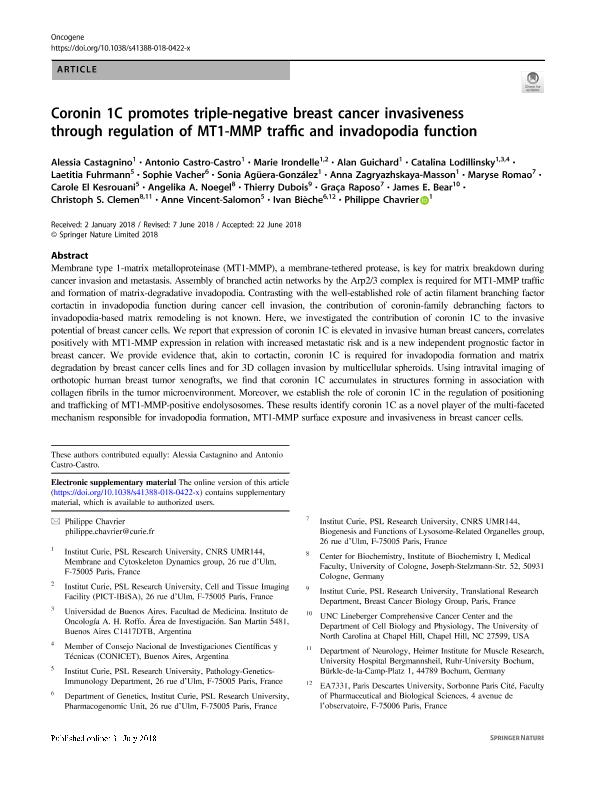Artículo
Coronin 1C promotes triple-negative breast cancer invasiveness through regulation of MT1-MMP traffic and invadopodia function
Castagnino, Alessia; Castro Castro, Antonio; Irondelle, Marie; Guichard, Alan; Lodillinsky, Catalina ; Fuhrmann, Laetitia; Vacher, Sophie; Agüera González, Sonia; Zagryazhskaya Masson, Anna; Romao, Maryse; El Kesrouani, Carole; Noegel, Angelika A.; Dubois, Thierry; Raposo, Graça; Bear, James E.; Clemen, Christoph S.; Vincent Salomon, Anne; Bièche, Ivan; Chavrier, Philippe
; Fuhrmann, Laetitia; Vacher, Sophie; Agüera González, Sonia; Zagryazhskaya Masson, Anna; Romao, Maryse; El Kesrouani, Carole; Noegel, Angelika A.; Dubois, Thierry; Raposo, Graça; Bear, James E.; Clemen, Christoph S.; Vincent Salomon, Anne; Bièche, Ivan; Chavrier, Philippe
 ; Fuhrmann, Laetitia; Vacher, Sophie; Agüera González, Sonia; Zagryazhskaya Masson, Anna; Romao, Maryse; El Kesrouani, Carole; Noegel, Angelika A.; Dubois, Thierry; Raposo, Graça; Bear, James E.; Clemen, Christoph S.; Vincent Salomon, Anne; Bièche, Ivan; Chavrier, Philippe
; Fuhrmann, Laetitia; Vacher, Sophie; Agüera González, Sonia; Zagryazhskaya Masson, Anna; Romao, Maryse; El Kesrouani, Carole; Noegel, Angelika A.; Dubois, Thierry; Raposo, Graça; Bear, James E.; Clemen, Christoph S.; Vincent Salomon, Anne; Bièche, Ivan; Chavrier, Philippe
Fecha de publicación:
07/2018
Editorial:
Nature Publishing Group
Revista:
Oncogene
ISSN:
0950-9232
Idioma:
Inglés
Tipo de recurso:
Artículo publicado
Clasificación temática:
Resumen
Membrane type 1-matrix metalloproteinase (MT1-MMP), a membrane-tethered protease, is key for matrix breakdown during cancer invasion and metastasis. Assembly of branched actin networks by the Arp2/3 complex is required for MT1-MMP traffic and formation of matrix-degradative invadopodia. Contrasting with the well-established role of actin filament branching factor cortactin in invadopodia function during cancer cell invasion, the contribution of coronin-family debranching factors to invadopodia-based matrix remodeling is not known. Here, we investigated the contribution of coronin 1C to the invasive potential of breast cancer cells. We report that expression of coronin 1C is elevated in invasive human breast cancers, correlates positively with MT1-MMP expression in relation with increased metastatic risk and is a new independent prognostic factor in breast cancer. We provide evidence that, akin to cortactin, coronin 1C is required for invadopodia formation and matrix degradation by breast cancer cells lines and for 3D collagen invasion by multicellular spheroids. Using intravital imaging of orthotopic human breast tumor xenografts, we find that coronin 1C accumulates in structures forming in association with collagen fibrils in the tumor microenvironment. Moreover, we establish the role of coronin 1C in the regulation of positioning and trafficking of MT1-MMP-positive endolysosomes. These results identify coronin 1C as a novel player of the multi-faceted mechanism responsible for invadopodia formation, MT1-MMP surface exposure and invasiveness in breast cancer cells.
Palabras clave:
CORONIN
,
MT1-MMP
,
BREAST CANCER
,
CELL INVASION
Archivos asociados
Licencia
Identificadores
Colecciones
Articulos(OCA HOUSSAY)
Articulos de OFICINA DE COORDINACION ADMINISTRATIVA HOUSSAY
Articulos de OFICINA DE COORDINACION ADMINISTRATIVA HOUSSAY
Citación
Castagnino, Alessia; Castro Castro, Antonio; Irondelle, Marie; Guichard, Alan; Lodillinsky, Catalina; et al.; Coronin 1C promotes triple-negative breast cancer invasiveness through regulation of MT1-MMP traffic and invadopodia function; Nature Publishing Group; Oncogene; 7-2018; 1-17
Compartir
Altmétricas



